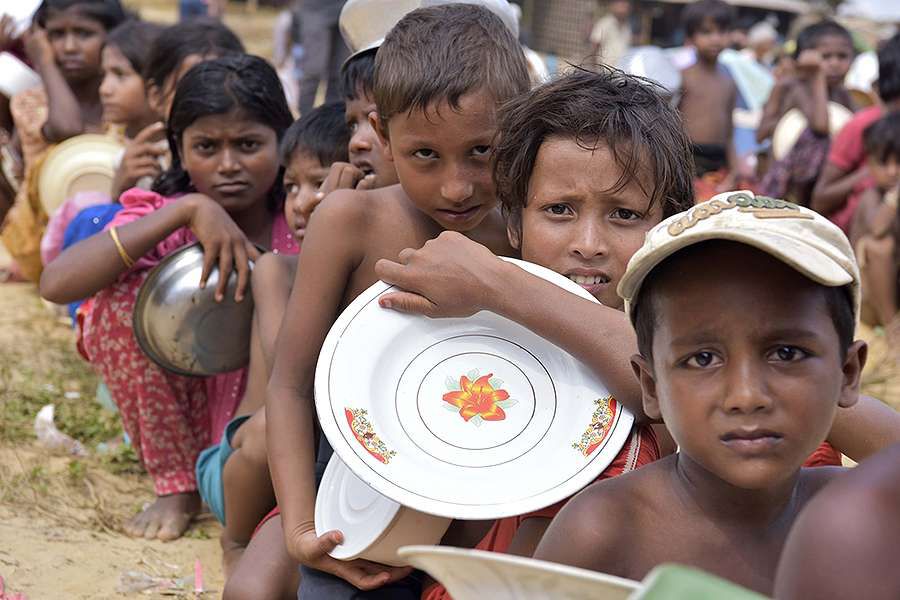When Pope Francis visits Burma, also known as Myanmar, this November, his visit will come at one of the most contentious periods of the country’s history.
Over the past month, state-supported violence against Burma’s Rohingya Muslim community — an ethnic and religious minority— has reached staggering levels, causing the United Nations to declare the situation “a textbook example of ethnic cleansing.”
“The scope of the humanitarian crisis is enormous and it’s ongoing,” said Daniel Mark, Chairman of the U.S. Commission on International Religious Freedom, in an interview with CNA. “Once again we unfortunately have another terrible crisis that’s focusing people’s attention on something that’s already a terrible situation.”
“This is a deep and longstanding problem that we’ve been trying to call attention to for a long time, but it’s going to need an extremely long and concerted effort to address,” Mark told CNA. “Even addressing the immediate humanitarian crisis is not going to solve this profound underlying issue of the Rohingya Muslims in Burma.”
For years, the Rohingya, an ethnic group whose main religion is Islam, have faced grave persecution in the Burmese state of Rakhine, where the majority of them live. An estimated 1.1 million Rohingya live within the majority-Buddhist country. Members of the group have been denied citizenship since the foundation of Burma in 1948, and have suffered violence, and the freedom to move or access clean water since a military coup d’etat in 1962.
After a different military regime took control in 1988, with even harsher military crackdowns throughout the country, the country has been referred to as Myanmar.
Pope Francis will visit the country in November, following stories of horrifying human rights abuses and a mass exodus of Rohingya civilians from Burma.
The most recent wave of violence began on Aug. 25, 2017, after which the Burmese military and local Buddhist vigilantes enacted a campaign of burning Rohingya villages and massacring the civilians within them. It is still unclear exactly how many people have been killed in the violence, but Bangladeshi Foreign Affairs minister Minister of Foreign Affairs has estimated that at least 3,000 have died so far. As many as 400,000 people have been displaced within the past month. Neighboring Bangladesh has accepted the majority of those refugees, and more people have been internally displaced within the country.
The military claims the violence is a response to attacks by a small group of Rohingya against border agents in the Rakhine province, which left 12 officers dead. However, the violence — which includes arson, sexual violence, and internal displacement — long precedes those attacks, and other demonstrations within Rohingya communities, said Olivia Enos, a policy analyst in the Asian Studies Center at The Heritage Foundation, who specializes in human rights.
“Maybe some individual Rohingya are acting out in self-defense, but to place blame on Rohingya is misleading,” Enos said.
“The military has a long, long history of burning homes and villages, raping women and children. The track record is so long that to place the blame on any kind of radical agents within the Rohingya would be really inaccurate.”
While violence and discrimination against the Rohingya people at the hands of Burmese authorities has been ongoing since the 1960s, with increases in persecution in 2012 and 2015, the current crisis is of particular concern, Enos said. She explained that the high levels of displacement and increased incidents of violence and destruction set this conflict apart from the ones that have come before.
Also concerning, she said, is the fact this conflict is occurring after democratic reforms which took place between 2011-2015. While the nation is becoming more democratic, she said, military still maintains significant control within Burma. Furthermore, the country’s leader - Nobel Peace Prize winner Aung San Suu Kyi— has remained silent when asked about the persecution of the group within her country.
To add to the worries, Enos fears that by focusing on the ethnic element of the conflict, Western leaders may overlook its religious aspect. “The vast majority of people in Burma are Buddhist and they view the Muslim minority group Rohingya as a threat to the native Burman society,” she said. “It’s a religious conflict.”
Mark stated that the religious element of the conflict has been a concern of the Commission since its founding in 1998. “As a result of this, we’ve been following this very, very carefully and for a long time,” he said We’ve recommended Burma be designated as a Country of Particular Concern every year,” a recommendation the U.S. Department of State has followed each year it’s made such designations.
The long history of the conflict means that while there are immediate steps that need to be taken to address the humanitarian situation, work to end the conflict will need to look at long-term solution. “This is all a result of the systematic exclusion of these people from Burmese society, he explained. “All the things we’re saying now about the treatment of Rohingya Muslims going forward are thing that we have been saying all along,” Mark continued.
“It’s been a tinderbox and that needs to be addressed.”
In the short term, Mark advocated for immediate humanitarian aid and assurance that humanitarian goods will get to those in need of them. He also called for accountability for human rights violations and a cessation of violence. He also noted the need for the international community to help support Bangladesh as it takes in tens of thousands of people a day, so a secondary crisis is not created there.
“Attacks need to stop and aid needs to start.”

